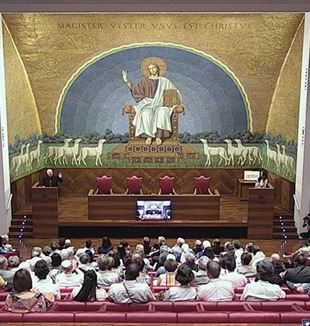
"Movements and new communities", formation on charisms
The contribution of the President of the fraternity of CL at the theological conference held June 20th at the Pontifical Lateran University, which helps to “look more deeply at what co-essentiality between charism and institution means.”Responding to Cardinal Kevin Farrell’s invitation to engage in appropriate formation work on the theme of the charisms in the Church, I think it could be useful to share with you, while we wait for the official acts, the video of the theological conference held June 20th at the Pontifical Lateran University on “Movements and New Communities. Identity along the Synodal Path of the Church.”
In addition to Cardinal Farrell, other speakers were Cardinal Marc Ouellet, the Prefect for the Congregation for Bishops and President of the Pontifical Commission for Latin America; Linda Ghisoni, Undersecretary of the Dicastery for the Laity, Family and Life; Fr. Piero Coda, General Secretary of the International Theological Commission and Professor of Trinitarian Ontology at the Sophia University Institute; Elena Di Bernardo, from the Canon Law Faculty of the Institutum Utriusque luris, Pontifical Lateran University; Mary Healy, Sacred Heart Major Seminary of Detroit, USA; and Luigino Bruni, Full Professor in Political Economics and coordinator of the doctoral program in Civil Economy Sciences, Lumsa University of Rome.
I believe it is truly important for members of the Fraternity and the Movement as a whole to find the time, if possible, to follow the full conference. All the talks were of great interest and help us to understand the ultimate meaning of the journey the Church is proposing to the movements.
In particular, some talks were especially clear and deep, beginning with that of Cardinal Farrell (morning session), who spoke of the enormous challenges that await us: “dynamic and creative faithfulness to the charism,” unity, synodality and missionality. Farrell stressed the need for “individual and communal discernment to perceive what the Holy Spirit is saying to the Church” and to each of her varied realities, and for “permanent formation offered to members, keeping in mind these new challenges.” He stressed that “the activities of apostolate and services of charity” that all the movements carry on “with admirable dedication” need to be adapted to these new challenges.
Similarly, I found the reflections of Cardinal Ouellet (afternoon session) to be very useful, as were his answers to questions posed by some representatives of movements present in the conference hall. In particular, he confirmed that the Church acknowledges the exceptional nature of the action of the Holy Spirit through the various charisms and, more specifically on the theme that concerns us, he underlined how the responsibility of the charism is always communitarian (even more clearly so when the founder is no longer alive). This led to his point that the regulations the Church proposes are not a restriction or limitation to the action of the Spirit (though Ouellet said that at times the Church can run this risk) but become a necessary instrument so that this communal dimension can truly express itself completely, helping to avoid precisely those praxes that risk favoring personalism or authoritarianism.
These contributions, like all the others, are an aid the Church offers us to look more deeply at what it means to speak about co-essentiality between charisms and institutions in the Church, as many times Fr. Giussani himself taught us: “Thus, the movements are called to two fundamental dimensions that in a certain sense certify their authenticity. The first is the filial reference to the Bishops and the Pope. The hierarchy does not have a monopoly on the charisms, but it possesses the charism of discernment and of the ordering of all the charisms for the common good of the Church. Secondly, the authentic charism must encourage fraternal openness to all the other experiences, which in a different way lead to the one truth about God and the human person revealed in Christ” (from: The Movements in the Mission of the Church–Three talks by John Paul II, Documents 5–Supplement to “Litterae Communionis-CL,” n. 11/1985, pp. 3-8).
In this regard, the text from which this passage by Fr. Giussani was taken is certainly another useful instrument for the journey of understanding and growth that is asked of us on these issues. You will find it here below, together with the two videos of the conference.
Luigi Giussani – Introduction to: THE MOVEMENTS IN THE MISSION OF THE CHURCH–Three talks by John Paul II
Documents 5 – Supplement to “Litterae Communionis-CL,” n. 11/1985, pp. 3-8.
(Download PDF)
Morning session
Afternoon session